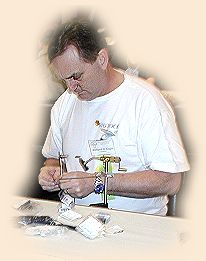I was part of a two hackle swaps lately. Several of
us got together and ordered necks of different colors.
We then plucked the feathers off, then divided the
feathers up equally. This way we got a variety of
colors to be able to use to tie.
Since most of these feathers would tie down to size 22
hooks and I had not used many of these I decided that
I needed to stock up on some smaller hooks. I ordered
in some 18's, 20's and 22's. I had not tied many flies
on anything smaller than a 14 and a few 16's. This
would be a new experience for me. Most of my tying
had been on size 6 to 12.
My habit is to tie most of the flies I use in three sizes
so I can match the hatch size wise better. I have always
kept the boxes open at the same time so I could just take
a hook out and tie the fly. I could change size as I
wanted also colors at the same time.
Another thing I do is to use hooks from different
manufactures. Mustad and Eagle Claw hooks are heavier
than some of the other brands but as I tie flies with
them I do not have to add weight and it lets the fly
drop a little faster. I could have from five to eight
boxes of hooks open at the same time at my fly tying
table.
I use an old desk for my tying table and have a piece
of 1 X 12" material that the vise is clamped to. There
is not really a spot on the desk to clamp the vise
where I could tie with it but I have the 1 X 12
lamped down so it will not move.
I got the hooks out and decided that I was going to tie
some flies with some horse hair, and woolly nylon I had
acquired. I was doing some midge patterns that I had
found on line. I had watched a fellow fisherman be very
successful with midges in Rocky Mountain National Park
last year and I did not want to be short when we go on
vacation again.
Started tying and decided to do three of each pattern
in each size. This would give me a nice number to use
and give a little variety in size. There is not as much
difference in size from and 18 to a 22 as there is from
a 6 to a 10. But I would trust the folks I had read who
said you would need a variety of sizes.
I had tied three flies when I was called to the phone.
With "Grace" not being my middle name I stood up and
jarred the vise as I did. This made the boxes of hooks
flip and I had 147 hooks spread out on my board and
tying desk. I went to the phone and found it was not
worth the time as it was a solicitation for something
I did not want.
I took a deep breath and went back into the room to
pick up the hooks. Put them all in one box and went
out to another table where I could spread the hooks
out and move them easier, as it has a glass top. It
took sorting about 10 hooks before I had the three
sizes split apart. I spent about 1.5 hours getting
this done. I lined them up by tens and found that I
was missing one hook. Looked but did not see it and
I was to the point where I was not sure that it was
worth looking for.
I took the hooks back into the tying room securely
closed and put them on the desk. I opened one box
and took out one hook, closed the box and tied the
fly. I have learned my lesson.
The boxes with size 6 to 10 hooks weigh a lot more
than those little hooks do and just don't jump around
as much. I had gotten lazy and paid for it. I am very
careful now and I even do this with the larger hooks
so it will stay as a habit. I do take two or three
hooks out at the same time and lay the extras on the
desk but no more than that.
I hope that you don't pull any stupid stunts like I
have been lately. I hope your tying goes well and
that you can get out on the water.
~ Richard Zieger
|



